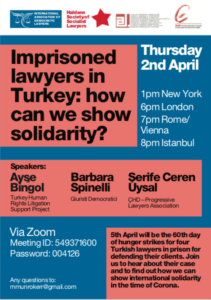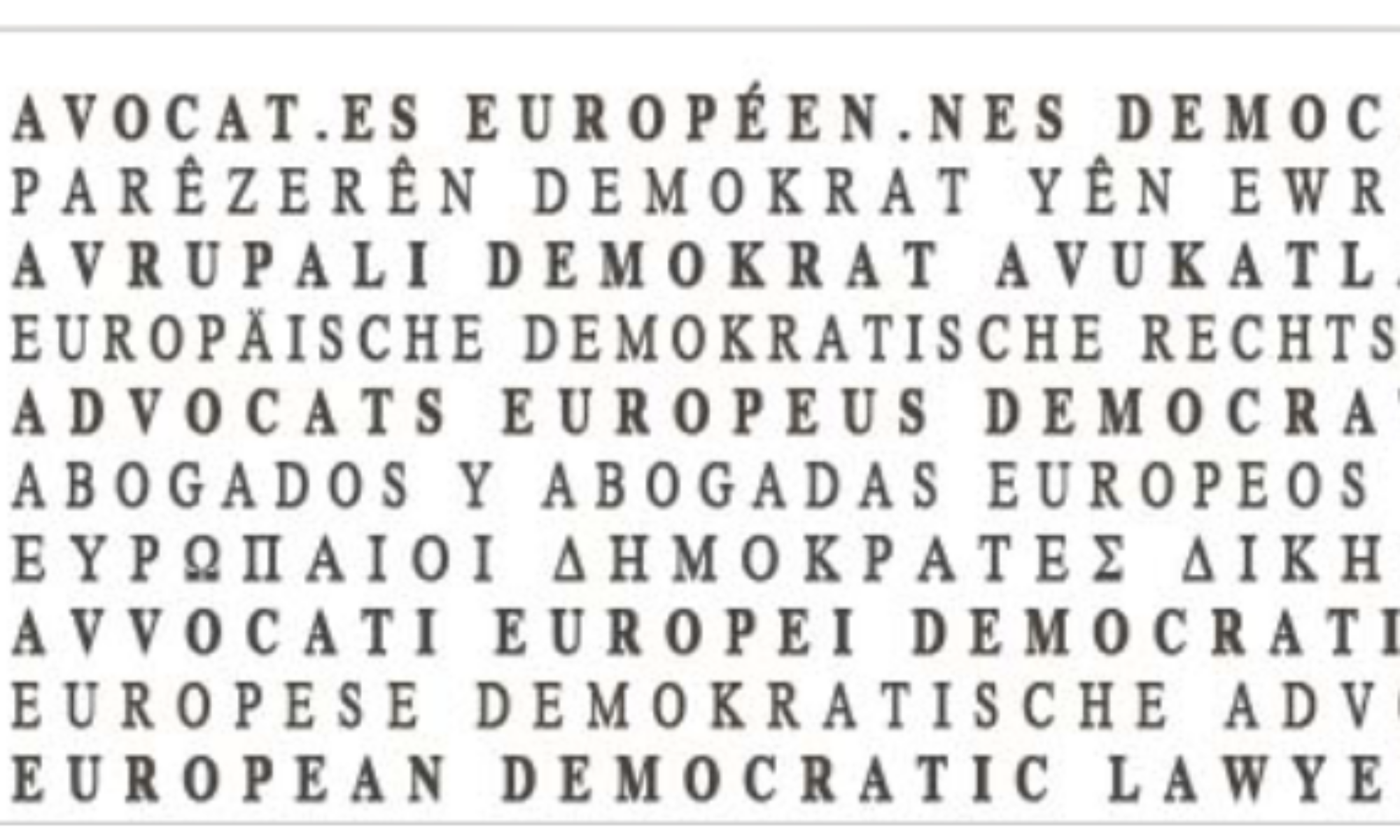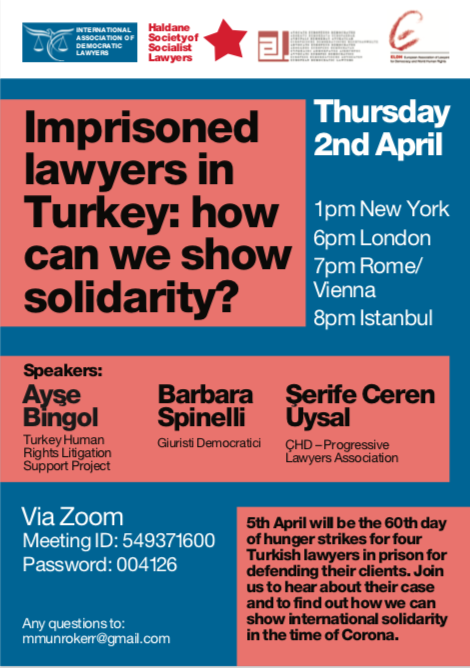(La versión en español más abajo)
As European Democratic Lawyers we are deeply concerned about the proceedings against two minors and a nineteen-year old, who have been under investigation by Maltese authorities for almost a year.
The context
In the night from 25th to 26th of March 2019, a rubber boat left Libya with approximately 114 people on board, including 20 women and at least 15 children. The boat was rescued by the oil tanker El Hiblu 1. A few hours later, the rescuees realized they were being returned to Libya.
As described by testimonies, scenes of despair and panic started, with many shouting that they would rather die at sea than be returned to Libya. According to the information gathered by Amnesty International, at no point during the journey did the rescues engage in any violent action against the captain, the chief officer or any other member of the crew. While the precise circumstances of the events on the El Hiblu 1 will be established at a later stage, nevertheless the responsible crewmembers of El Hiblu 1 decided to direct the vessel towards Malta. Maltese military escorted the ship to Malta where the passengers disembarked.
Three of the 108 rescued passengers – two minors (15 and 16 year old at the time) as well as a nineteen year old teenager were immediately arrested and imprisoned for eight months. They were released on bail in the end of November, 2019 and are known as the El Hiblu 3.
Maltese authorities charged the three teenagers with a series of grave offences, including acts of terrorism as well as for allegedly hijacking the ship and forcing it to go to Malta. Some of these crimes are punishable with life imprisonment. A inquiry is ongoing in Malta to gather evidence, which will be submitted to the court once the Attorney General issues a formal indictment against the youth.
The association AED is concerned that Maltese authorities are not appropriately taking into account European and International law, including the fundamental rights of refugees and migrants in distress at sea and the human rights of vulnerable groups like minors.
As lawyers we would like to underline the regulations to be followed:
Sea rescue to a place of safety (POS) is a fundamental right
- The Law of the Sea and international customary law contain the obligation to rescue at sea and determine how this is to be carried out in detail
- According to the Hamburg Convention, followed by others, a place of safety[1] is the place where rescue operations are considered to terminate because the survivors’ life is no longer under threat and their basic human needs (such as food, shelter and medical needs) can be met, a place of safety in no way jeopardises their fundamental rights, since the notion of ‘safety’ extends beyond mere protection from physical danger and takes into account the fundamental rights of the place of disembarkation. The need to avoid disembarkation in territories where the lives and freedoms of those alleging a well-founded fear of persecution would be threatened has to be taken in consideration as a legal principle of international and European law.
- International agreement, which includes the EU, state Libya, very clearly, is not a place of safety for the disembarkation of refugees and migrants rescued at sea. UN and European human rights reports document systematic human rights violations against migrants in Libya, including unlawful killings, arbitrary detention, torture and inhuman detention conditions, alarming rates of malnutrition, sexual and gender-based violence including gang rape, slavery, forced labour and extortion.[2]
- In addition, EU Member States have to respect their obligations under international refugee law (non-refoulement principle of the 1951 Refugee Convention) and human rights law: the protection against torture and inhuman and degrading treatment as an absolute right and the right to life based on the European Convention on Human Rights/ ECHR. According to ECHR settled case law, the security of the place of safety refers principally to the physical security of the individuals involved but also, to the effective possibility to request asylum. These obligations exist wherever states exercise jurisdiction in the meaning of effective and exclusive control, including places outside their territory e.g. on the high seas.[3] In the light of these clear responsibilities resulting from the ECHR, likewise the principle of non-refoulement of the Refugee Convention has to be interpreted in the same manner: the principle of non-refoulement binds states in each moment of effective and exclusive control.
- Taking the above into consideration, any instruction of a State to disembark rescued people in Libya is an unlawful order and a violation of several international and European laws. On the one side non-state vessels and their shipmasters have the duty and obligation to obey lawful orders on the other side they have the legal obligation to the national constitutions and domestic laws not to become partner in crime and not to obey unlawful instructions violating international and human rights law. Confronted with these conflicting obligations they are independent not to obey unlawful orders and the people who issue them. Since the Nuremberg trials following World War II, it is clear that individuals must not obey orders of state representatives if these orders violate international and human rights law: “The justification for acts done pursuant to orders does not exist if the order was of such a nature that a man of ordinary sense and understanding would know it to be illegal.”[4]
- Considering the above mentioned legal situation the refugees on board of the El Hiblu 1 acted to defend their right to life and their absolute right of not being subjected to torture, rape, slavery and other cruel and inhuman treatment, as forbidden in international and human rights treatis. In a similar case the Tribunal of Trapani acknowledged the proportionality of the defendants’ acts, since the right to life and not to be subject to inhuman or degrading treatments cannot be limited by the right of the crew. In the eyes of the judge, if such defensive actions had not been taken, the migrants would have been surely brought back to Libya; the naturally necessity of those actions has to be acknowledged since the defendants did not have the possibility to escape the vessel and its destination.[5] Especially important in the El Hiblu Case is the young age of the minors who tried to save their and the life of all other people on board having in mind what would happen to them when they returned to the “hell of Libya”. There are strong indications that their acting on board was justified under the legal institute of self-defence.
AED calls on Maltese authorities
- to fully implement all obligations stemming from international, European, human rights and refugee-law as well as the obligation regarding the UN Convention on the rights of the child;
- to respect the right of justified self-defence against unlawful acts subjecting people to torture, rape, slavery and other cruel and inhuman treatment forbidden in international and human rights law;
- to ensure that fair trial guarantees are fully upheld;
- to ensure, that the defendants have adequate access to all their rights without any kind of restriction;
- to recognize that the defendants are vulnerable minors with special needs to be met and to implement all obligations resulting from the UN Convention on the rights of the child in this regard;
- to stop any kind of cooperation with Libya on migration, ensuring the respect of the rights of refugees and migrants in the country.
- We therefore strongly recommend the establishment on an independent trial observation regarding the criminal proceedings against the “El Hiblu 3”. We call on democratic society to observe the trial and the future of these youngsters.
27/03/2020
Madrid, Barcelona, Paris, Rome, Amsterdam, Istanbul, Berlin, Brussels, Athens
[1] 1979 Hamburg Convention, which provides that the State that conducts a rescue operation – even if not in the SAR zone of its competence – is responsible for the landfall and the disembarkation of the individuals in a safe harbour (the so called place of safety, POS); two supplementary protocols to the SOLAS Convention (Ris. MSC. 153 (78), 20 May 2004) and the SAR Convention (Ris. MSC. 155 (78), 20 May 2004), which entered into force on 1 July 2006 and the Guidelines in the Treatment of Persons Rescued at Sea, IMO Resolution MSC.167(78), 10. Mai 2004, IMO Doc. MSC 78/26/Add.2, Annex 34; (IMO, Facilitation Committee, Principles Relating to Administrative Procedures for Disembarking Persons Rescued at Sea, IMO Doc. FAL.3/Circ.194, 22. January 2009; Council of Europe, Res. 1821(2011) on the Interception and rescue at sea of asylum seekers,refugees and irregular migrants, 21th of June 2011)
[2] https://www.ohchr.org/en/NewsEvents/Pages/DisplayNews.aspx?NewsID=24569&LangID=E
[3] ECtHR (GC), Hirsi Jamaa et al. v. Italy, Ap.No.27765/09, 23.02.2012, para 73, 76 et seqq
[4] United States v. Keenan, Court of Military Appeals, 39 C.M.R. 108, 110 (1969)
[5] Date of Decision: 23-05-2019, Tribunal of Trapani/ Italy, https://www.asylumlawdatabase.eu/en/content/decision-tribunal-trapani-preliminary-judge-23-may-2019
ALTO AL PROCESAMIENTO DE LOS TRES DE EL HIBLU-1
Como abogados y abogadas europeos/as demócratas deseamos mostrar nuestra preocupación por las diligencias de investigación abiertas por las autoridades de la Republica de Malta (país integrante de la UE) contra dos menores y un joven de 19 años desde hace casi un año.
El contexto
En la noche del 25 al 26 de marzo de 2019, una patera, embarcación de goma, que había partido de Libia con aproximadamente 114 personas, incluyendo 20 mujeres y al menos 15 menores fue rescatada por el buque de aprovisionamiento de combustible El Hiblu 1. Varias horas mas tarde los rescatados de la patera comprobaron que les llevaban a Libia. Por los testimonios descritos, se produjeron escenas de desesperación y pánico con protestas en los que se gritaba que preferían morir en el mar que retornar a Libia. Según información recabada por Amnistía Internacional, en ningún momento durante el trayecto hubo acciones violentas contra el capitán, el primer oficial, o ningún otro miembro de la tripulación. Con independencia de que las concretas circunstancias producidas a bordo de El Hiblu 1 sean declaradas probadas mas adelante, lo cierto es que los responsables de la tripulación decidieron llevar su embarcación hacia Malta, al tiempo que militares malteses acompañaron al buque a la costa de Malta donde los pasajeros desembarcaron.
Tres de los 108 pasajeros, dos menores de 15 y 16 años (edad a marzo de 2019) así como un joven de 19 años fueron inmediatamente detenidos y enviados a prisión donde permanecieron durante ocho meses, momento en el que fueron puestos en libertad bajo fianza a finales de noviembre de 2019 y a los que se les conoce como los “Los tres de El Hiblu 1″. Las autoridades de Malta acusan a los tres jóvenes de una serie de delitos graves, incluidos supuestos delitos de terrorismo y de secuestro del barco, obligándolo a dirigirse a Malta. Algunos de estos delitos llevan aparejadas condenas de prisión perpetua. La investigación esta llevándose a cabo y llegará al Juzgado una vez el Fiscal General formalice el escrito de acusación contra los tres jóvenes.
AED muestra su preocupación puesto que las autoridades de Malta no están teniendo en cuenta, de manera adecuada, la normativa europea e internacional, incluyendo el derecho fundamental de las personas refugiadas y migrantes en situación de peligro en el mar y los derechos humanos de grupos vulnerables como los/as niños/as integrantes de la embarcación.
Como letrados y letradas quisiéramos apuntar la distinta normativa que tendrá que tenerse en cuenta puesto que el rescate a un puerto seguro es un derecho fundamental:
1.-El Derecho del Mar y la costumbre internacional contiene la obligación de salvamento marítimo y determina en detalle como se debe realizar.
2.- Según las Reglas de Hamburgo y demás normativa, un lugar seguro [Place of Safety- POS- en su acepción en inglés][1] es un lugar donde las operaciones de rescate pueden darse por finalizadas puesto que la vida de los supervivientes no corre ya peligro y sus necesidades humanas básicas, tales como la alimentación, cobijo y necesidades sanitarias son garantizadas, es decir un lugar seguro no puede poner en peligro sus derechos fundamentales, puesto que la seguridad (safety en su acepción en inglés) abarca mas allá que la mera protección del peligro físico y tiene en consideración los derechos fundamentales del lugar del desembarco.
La necesidad de evitar el desembarco de aquellas personas, que aleguen un motivo fundado de temor a ser perseguidas, en territorios donde sus vidas y libertades puedan suponer una amenaza deber ser tenido en cuenta como principio legal del Derecho europeo y el Derecho internacional.
3.- Acuerdo internacional, que incluye a la UE, expone que Libia no es en absoluto un lugar seguro para el desembarco de personas refugiadas y migrantes rescatadas en el mar. Los informes europeos y de NNUU sobre los derechos humanos informan de una sistemática violación de los derechos humanos contra migrantes en Libia, e incluye ejecuciones extrajudiciales, detenciones arbitrarias, torturas y condiciones de detención inhumanas, cifras alarmantes de malnutrido, violencia sexual y por razones de genero que incluyen violaciones en grupo, esclavitud, extorsiones y trabajos forzados.[2]
4.-Ademas, los países miembros de la UE deben respetar sus obligaciones bajo el Derecho internacional sobre personas refugiadas-Protección internacional (principio de no devolución de la Convención de Ginebra sobre refugiados de 1951) y el resto de normativa de Derechos Humanos: la protección contra la tortura y todo trato inhumano y degradante es un derecho incondicional así como la protección del derecho a la vida estan recogidos en el Convenio Europeo de Derechos Humanos (CEDH). Según jurisprudencia consolidada del TEDH, la seguridad del “lugar seguro” hace referencia principalmente a la seguridad física de las personas que acceden a ese lugar seguro, pero también a la posibilidad de solicitar y tener acceso a un proceso de protección internacional (derecho de asilo). Estas obligaciones existen en todo lugar donde un estado ejerce su jurisdicción con control efectivo y exclusivo, incluyendo lugares fuera de su territorio como en alta mar[3]. A la luz de esta clara responsabilidad en base al Convenio Europeo de Derechos Humanos (CEDH), de igual forma el principio de no devolución de la Convención de Ginebra de 1951 debe ser interpretado de forma análoga, dicho principio compele al estado a cada momento del control efectivo y exclusivo.
5.- Teniendo en cuenta lo anteriormente expuesto, cualquier orden de un Estado para desembarcar a personas en Libia es un acto ilegal y supone una violación de varias normas de Derecho europeo e internacional. Por un lado, las embarcaciones que no tengan pabellón de ningun estado y los capitanes de los mismos tienen el deber y la obligación de obedecer ordenes legales, y por otro tienen la obligación legal en base a las constituciones nacionales y normas internas de no ser participe de un delito y de no obedecer instrucciones ilegales que violen las normas internacionales y de derechos humanos. Cuando se vean ante estas obligaciones en conflicto, son independientes para no obedecer ordenes ilegales y a aquellos que las dictan. Desde los juicios de Nuremberg tras la Segunda Guerra Mundial, es claro que los individuos no deben obedecer a los representantes de sus estados si dichas ordenes violan normativa internacional y de derechos humanos. “La justificación de la obediencia debida no aplicaría si las ordenes ejecutadas fueran de tal naturaleza que una persona con sentido y entendimiento común medio las considerara ilegales“[4]
6.- Considerando la situación legal anteriormente mencionada, las personas refugiadas a bordo de El Hiblu 1 actuaron para defender su derecho a la vida y su derecho incondicional a no ser sometido a tortura, violación, esclavitud y otros tratos crueles e inhumanos, prohibidos por tratados internacionales y de derechos humanos. En un caso similar, el Tribunal de Trapani reconoció la proporcionalidad de los actos de la parte denunciada, puesto que el derecho a la vida y a no ser sometido a tratos degradantes o inhumanos no puede ser limitado por parte de la tripulación de la embarcación. A ojos del juzgador, si tales acciones defensivas no hubieran sido tomadas, las personas migrantes habrían sido seguramente llevadas a Libia, la necesidad natural de tales acciones debe ser reconocida puesto que la parte denunciada no tenia posibilidad de escapar del buque y del lugar de destino al que les llevaban.[5] Especialmente importante en el caso de El Hiblu 1 es la corta edad de los jóvenes que trataron de salvar su vida y la del resto de sus acompañantes, teniendo en cuenta lo que les iba a ocurrir si volvían al “infierno de Libia”. Hay indicios consistentes de que sus acciones a bordo fueron justificadas bajo la institución de la legitima defensa.
AED hace un llamamiento a las autoridades de Malta:
- a cumplir plenamente con sus obligaciones emanadas de la normativa europea, internacional, de derechos humanos y de protección internacional/refugio así como las obligaciones de la Convención sobre los derechos del niño de NNUU.
- a respetar el derecho a la legitima defensa contra actos ilegales que someten a las personas a tortura, violación, esclavitud y otros tratos crueles e inhumanos prohibidos en la normativa internacional y de derechos humanos.
- a asegurar que se celebre un juicio con todas las garantías.
- a asegurar que la parte denunciada tienen un acceso adecuado a todos sus derechos sin ningun tipo de restricción.
- a reconocer que la parte denunciada son menores vulnerables con unas necesidades especiales que deben ser garantizadas e implementar todas las obligaciones inherentes a la Convención sobre Derechos del niño de NNUU.
- a parar cualquier cooperación con Libia sobre migración, asegurando el respeto a los derechos de las personas refugiadas y migrantes en su territorio.
Por todo lo expuesto recomendamos encarecidamente la creación de un observatorio independiente del proceso judicial de los “Tres de El Hiblu-1″. Hacemos un llamamiento a la sociedad democrática para monitorizar el juicio y el futuro de esos tres jóvenes.
Madrid, Barcelona, Paris, Rome, Amsterdam, Istanbul, Berlin, Brussels, Athens, marzo de 2020.
[1] 1979 La Convención de Hamburgo que estipula que el Estado que lleva a cabo una operación de salvamento marítimo-incluso en la zona de búsqueda y rescate que no sea de su competencia-es responsable de alcanzar tierra y desembarcar a los náufragos en un puerto seguro (el así llamado lugar seguro, POS en su acepción en inglés); dos protocolos suplementarios a la Convención SOLAS (Ris. MSC. 153 (78), 20 May 2004) y la Convención SAR (Ris. MSC. 155 (78), 20 Mayo 2004), que entró en vigor el 1 de julio de 2006 y las Directrices respecto de la actuación con las personas rescatadas en el mar, IMO-OMI Resolución MSC.167(78), 10. Mayo 2004, IMO-OMI Doc. MSC 78/26/Add.2, Annex 34; (IMO-OMI, Facilitation Committee, Principios relacionados con los procedimientos administrativos para el desembarco de las personas rescatadas en el mar, IMO-OMI Doc. FAL.3/Circ.194, 22. Enero 2009; Consejo de Europa , Res. 1821(2011) sobre Interceptación y salvamento marítimo de solicitantes de asilo, personas refugiadas y migrantes irregulares, 21 de Junio 2011)
[2] https://www.ohchr.org/en/NewsEvents/Pages/DisplayNews.aspx?NewsID=24569&LangID=E
[3] TEDH (GC), Hirsi Jamaa et al. v. Italy, Ap.No.27765/09, 23.02.2012, para 73, 76 et seqq
[4] United States v. Keenan, Court of Military Appeals, 39 C.M.R. 108, 110 (1969)
[5] Fecha de sentencia: 23-05-2019, Tribunal de Trapani/ Italia,
https://www.asylumlawdatabase.eu/en/content/decision-tribunal-trapani-preliminary-judge-23-may-2019






